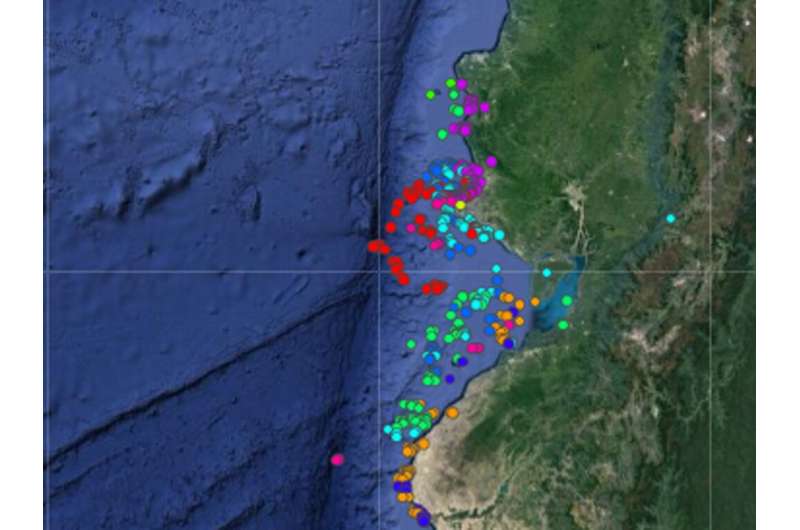
Ten humpback whales have been tagged with satellite transmitters off the coast of Ecuador during the 2022 migration season as part of a new partnership between the Pontifical Catholic University of Ecuador (PUCE) and Whales & Climate Research Program (WCP) at Griffith University.
A team comprising researchers from PUCE, The Whale Museum, Pacific Whale Foundation and the Smithsonian Tropical Research Institute, deployed tags on adult whales in mid-September off Salinas, before whales started their migration to Antarctica.
The satellite tags used are state-of-the-art transmitters able to transmit location data for hundreds of days. In addition, data on behavior as well as blubber skin samples were taken for genetic studies.
Researchers expect that the tags will track the whales’ movements in the next three to six months to provide new insights into how humpback whales might adapt to climate change.
Humpback whales that frequent the coasts of Ecuador, Colombia, Panama and Costa Rica between June and October to reproduce belong to one of the seven stocks in the southern hemisphere.
Every year around 12,000 whales from this population migrate more than 15,000 km along the west coast of South America to mate and nurse their calves in the warm tropical waters of north-western South America.
During this period, the whales spend between three and four months without feeding, so once the reserves are depleted, they have to return to Antarctic waters for feeding.
The work forms part of the global research activities of the Whales & Climate Research Program, an initiative that brings together more than 25 researchers from eight institutions in the southern hemisphere under the leadership of Griffith University.
So far, most of the tagged whales were still on the breeding grounds in the Gulf of Guayaquil, Ecuador, but some had already started their migratory route to feeding areas in southern Chile and Antarctica.
The whales can be live tracked via the Whales and Climate Research Program page and the research supported at whalesandclimate.org/donate.
Griffith University’s WCP manager, Dr. Olaf Meynecke said, “The data from these satellite-tagged humpback whales now traveling from their breeding to feeding grounds will provide us with unique information about migration patterns in that region. The data will assist in the development of models to predict climate change impacts on whales. A further 10 to 15 individuals will be fitted with satellite transmitters in the coming seasons.”
PUCE’s Dr. Fernando Felix said, “Although this population has recovered from whaling, human activities such as fishing and shipping persist as major threats that take their toll every year. Changes in the physical and chemical conditions in the ocean as foreseen in the coming decades will exacerbate the problem. Scientists need more reliable information on the environmental conditions that drive whale distribution and migration behavior to advise decision-makers.”
Dr. Hector Guzman from the Smithsonian Tropical Research Institute, Panama said, “We placed satellite transmitters on 10 humpback whales in Salinas (Ecuador), already on their migratory route to feeding areas in Chile and Antarctica. We tagged 5 adult females with calves and five adults, mostly males. I have been deploying satellite tags on humpback whales, blue whales, orcas and other whales to learn about their little-known migration and movement ecology, and to detect how global change in oceans may be changing their behavior.”
Professor Brendan Mackey, WCP Co-Director at Griffith, said, “Understanding how climate change is affecting whales in the Southern Hemisphere is really important for their conservation. But this is a huge task that can only be achieved through scientists collaborating globally. The satellite tagging of the 10 humpback whales in Ecuador kicks off a new research program between Australia, South African and South American university researchers.”
Explore further
Discovering the whereabouts of the inclusive southern right whale during the warmer months
Satellite tags on track to explore climate impacts on whale migrations (2022, October 18)
retrieved 19 October 2022
from https://phys.org/news/2022-10-satellite-tags-track-explore-climate.html
part may be reproduced without the written permission. The content is provided for information purposes only.